GCTA Q1 2024 Newsletter
“At GCTA, we are immensely grateful for the dedication and collaboration of our partners in achieving significant milestones during the first quarter of this year. Together, we are making strides in our mission to end TB and ensure health for all!”
Blessina Kumar CEO, GCTA
Resonating Voices: GCTA Members Speak, We Listen
GCTA Strategic Objective 2: Coalition-Building & Strategic Communications

Your voices matter, and in our recent evaluation survey, you shared invaluable feedback that shapes our journey. Here are the key takeaways:
- Positive ratings for GCTA's achievements in 2023, with some lauding it as exceptional
- Commendations for amplifying TB community voices at significant platforms like the UNHLM on TB and the Union Conference 2023
- Positive feedback on communication via listservs and virtual meetings
- Suggestions for enhancement include fostering better information exchange with larger institutions and diverse engagement activities
Empowering Communities with Resources on the Shorter, All-Oral DR-TB Regimen
February 21
GCTA Strategic Objective 1: Issue-based Advocacy
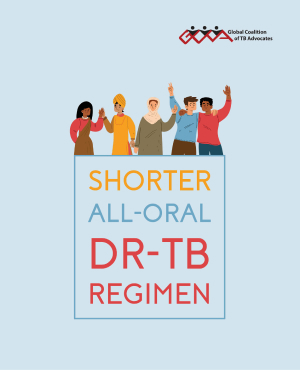
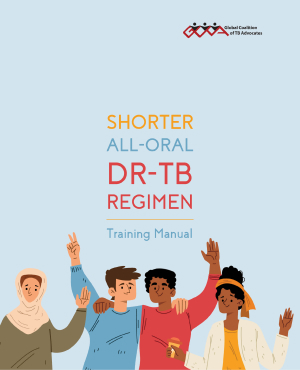
Blessina Kumar, CEO, GCTA, launched a groundbreaking Community Brochure and Training Manual on the shorter, all-oral DR-TB regimen in GCTA’s ongoing commitment to empower the community, fight drug-resistant TB and improve treatment accessibility. “Personally, as an advocate, I eagerly anticipate the swift implementation of the shorter, all-oral DR-TB regimen in my country,” she said at the documents’ launch.
These resources, developed specially for communities in simple non medicalized language, were field tested and equip communities with essential knowledge about the game-changing BPaL/BPaLM regimen, driving progress towards our objective of rights-based, people-centered TB response.
"It brings me immense joy to see the Global Coalition of TB Advocates’ proactive approach in developing a comprehensive training manual and community brochure for communities on the BPaLM/BPaL regimen. I'm confident that these will be extremely helpful for communities worldwide to support the roll-out of BPaLM in their countries. WHO stands ready to lend its unwavering support to the community every step of the way," stated Tereza Kasaeva, Director, WHO Global TB Programme.
Advocacy and Coalition-Building in Indonesia & the Philippines
March 6 | March 8
GCTA Strategic Objective 2: Coalition-Building & Strategic Communications
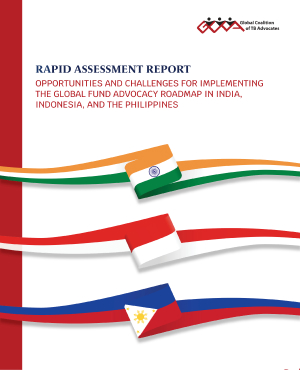
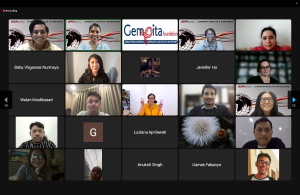
GCTA leveraged a grant by The Global Fund to Fight HIV, Tuberculosis and Malaria to conduct an advocacy ecosystem analysis in India, Indonesia and the Philippines, and consequently convened virtual dialogues with HIV, TB, and malaria communities in Indonesia and the Philippines to explore coalition-building. The virtual dialogues were conducted in collaboration with the Global Fund Advocates Network Asia-Pacific( GFAN AP).
Blessina Kumar, CEO, GCTA shared key insights from GCTA’s advocacy ecosystem analysis in the region with over 180 participants from diverse organizations and spoke passionately about creating a larger and more inclusive impact in health advocacy. The Global Fund, GFAN AP and India Working Group on Health Advocacy (IWG) also presented. The dialogues with the enthusiastic communities highlighted their eagerness to advance their respective advocacy goals by working together across diseases.
Celebrating International Women’s Day
March 8
GCTA Strategic Objective 1: Issue-Based Advocacy
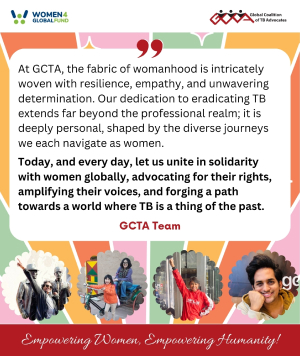
On International Women's Day, GCTA joined forces with Women4GlobalFund to celebrate the resilience and strength of women in the fight against TB. Our social media campaign spotlighted inspiring female TB survivors and dedicated women working towards a TB free future. Their voices echoed the importance of gender equality and empowerment in combating TB, inspiring us all to work towards a healthier, more equitable world.
TPT4India: A Cross-Disease Network for Accelerating TB Prevention
March 14
GCTA Strategic Objective 1, 2, & 4: Issue-Based Advocacy, Coalition-Building and Strategic Communications, Capacity Building
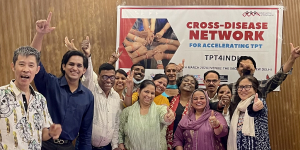
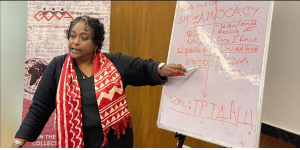
TPT4India, established by GCTA in 2023 as part of our IMPAACT4TB initiative, stands as a unified force representing diverse communities including TB-affected individuals, people living with HIV, people who use drugs, and sex workers. Recently, the network convened its third in-person meeting, intensifying discussions on robust advocacy strategies for 2024. Key focus areas of advocacy include fostering demand for 1HP and 3HP treatments across India and monitoring awareness of and accessibility to TB prevention services within their communities.
National Training of Trainers on TB Diagnostics
March 15-16
GCTA Strategic Objective 4: Capacity Building
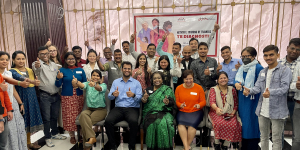
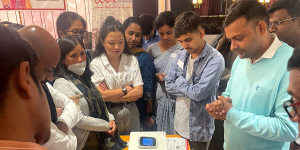
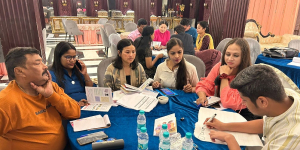
GCTA, in collaboration with Molbio Diagnostics, conducted a National Training of Trainers (ToT) for 25 carefully selected community champions from 10 Indian states. In her inaugural address, Blessina Kumar, CEO, GCTA, shared “Conversations with TB survivors across the world have highlighted that it can take 4 weeks to 18 months to receive a correct diagnosis for TB. This gap needs to be addressed urgently! GCTA has organized this ToT to build capacity of midlevel managers in TB to find people with TB quickly!”
The participants were equipped with in-depth knowledge of WHO-recommended rapid molecular diagnostics (WRMD), bridging the gap between the onset of symptoms and TB diagnosis while honing their evidence-based advocacy prowess. They will leverage the expertise gained through this 2-day training by leading two regional TB diagnostics training sessions, amplifying the impact of our collective efforts.
Virtual Roundtable: Global Commitments to Local Action
March 21
GCTA Strategic Objective 1: Issue-Based Advocacy
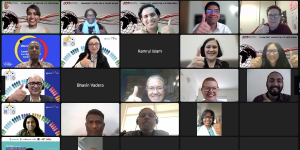
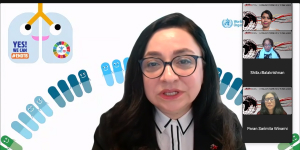
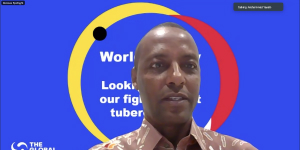
The virtual roundtable convened by GCTA andWHO SEARO brought together global experts, TB survivors, and community advocates to discuss translating global commitments into local action. It emphasized the pivotal role of communities in driving impactful initiatives and showcased inspiring stories of collaboration and advocacy across diverse regions. The event underscored the power of partnership and community-led efforts in the fight against TB.
The roundtable discussion was moderated by Ms Blessina Kumar and our distinguished panel included Kamrul Islam, a TB Survivor from Bangladesh, Dr. Tereza Kasaeva from WHO HQ, Dr. Suman Rijal from WHO SEARO, Dr. Tiara Pakasi from NTP Indonesia, Dr. Mohammed Yassin from The GlobalFund to Fight AIDS, Tuberculosis, and Malaria, and Dr. Amar Shah from USAID/India.
GCTA-Youth Launched inBrazil, Cameroon, India and South Africa
March 24
GCTA Strategic Objective 2 & 4: Coalition-Building and Strategic Communications & Capacity Building
GCTA is a proud grantee of the Challenge Facility for Civil Society CFCS Round12. Our goal is to build a Youth movement in the TB response. We start off with launching 4 Youth Coalitions in 4 countries with our partners Forum Ong Aids RS in Brazil, FIS Cameroon, TB Proof South Africa, and in India.
World TB Day Joint Statement: Yes! We can End TB by Tackling Health Inequalities to Ensure Health for All
March 24
GCTA Strategic Objective 2: Coalition-Building and Strategic Communications
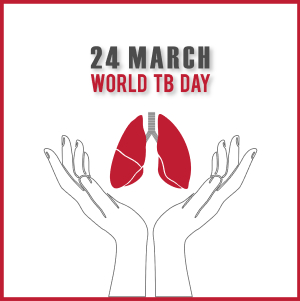
On World TB Day, GCTA and GFAN AP released a joint statement emphasizing the importance of turning global commitments into concrete actions. The statement recognizes the pivotal role of the Global Fund in funding TB programs and urges increased resources and political commitment to end TB as an epidemic by 2030. It calls for high-level leadership, investments, and community-led programs to combat TB stigma and reach vulnerable populations effectively. The complete statement can be found here.
World TB Day Joint Statement: Urgent Call for Gender-Inclusive TB Response
March 24
GCTA Strategic Objective 2: Coalition-Building and Strategic Communications
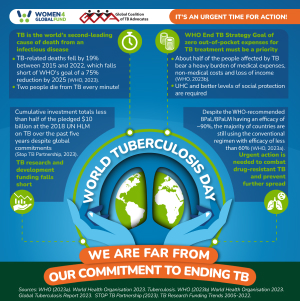
On World TB Day, GCTA collaborated with Women4GlobalFund to highlight gender disparities in access to TB services and signed on to a joint letter calling for political will to align TB response efforts with global commitments, increase investment in women-led initiatives, ensure equitable access to TB healthcare, strengthen legal frameworks, and support innovative financing for TB programs. Emphasizing universal health coverage as a key strategy, we urged urgent action to eliminate gender barriers. The complete statement can be found here.
Partner Spotlight: United for Global Mental Health
Accelerating Prevention through integrating Mental HealthServices into TB Programmes
An estimated 45% of people diagnosed with Tuberculosis (TB) experience depression. It can be caused by a range of factors, including the stigma that surrounds the condition. The combination of mental and physical ill health (the “comorbidity”) can affect infection-control, care-seeking behaviour, and medication adherence. TB treatment can itself contribute to stress and emotional strain.
United for Global Mental Health’s "Bending the Curve" report showed that integrating mental health care into TB services could result in as many as 14 million TB cases being avoided. That’s more than the predicted number of cases for any year between now and 2030.
It could also lead to better treatment outcomes, including medication adherence, treatment completion, and cure.
These findings are already being translated into policy, funding, and practice. Countries such as Mongolia and thePhilippines have incorporated mental health care into TB services. In Mongolia, organisations such as the Mongolian Anti-TB Coalition have advocated for including mental health in national HIV and TB funding requests to the GlobalFund. In the Philippines, mental health features prominently in the service package for both HIV and TB programmes, reflecting a commitment to comprehensive, integrated person-centred care.
Furthermore, the political declarations from the 2023 UN General Assembly High-Level Meeting on Ending TB included strong recommendations for the integration of mental health into TB care and services.
The World Health Organisation has taken a crucial step by providing a guidance document and an e-course on TB and mental health. This resource helps healthcare professionals identify and manage mental health conditions, such as depression and anxiety, during TB treatment. It marks progress towards a more compassionate approach to TB care. Beyond the physical health support required by those at risk of, or living with TB, many people also need mental health support and therefore we call upon stakeholders to ensure that mental health services are integrated into TB programming.
Sarah Kline, co-founder and CEO, United for Global Mental Health
